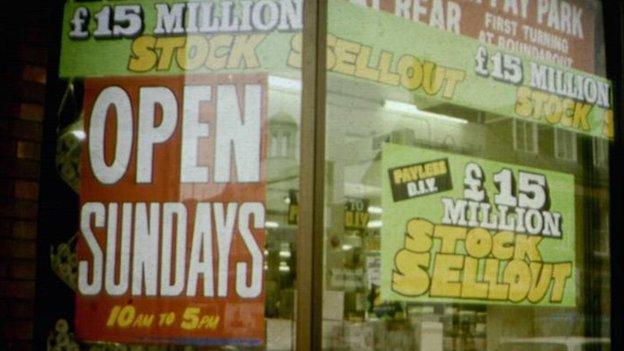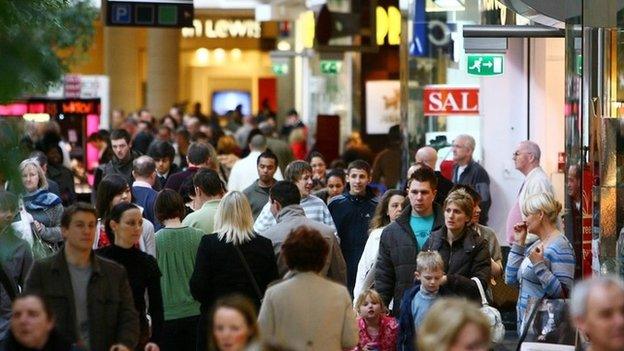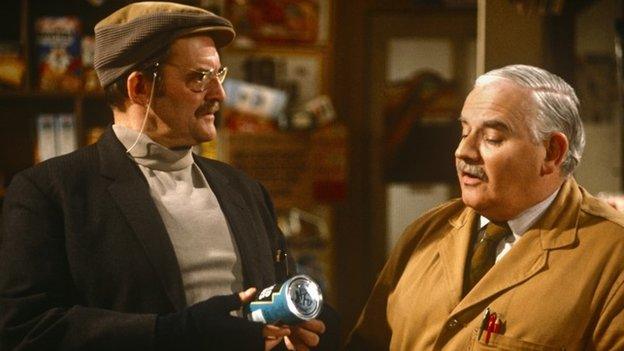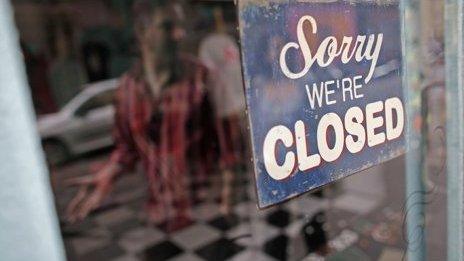Open all hours? The arguments over Sunday trading
- Published

Sunday opening has divided opinion for more than 60 years
The government is considering making it easier for big stores to open longer than the six hours currently permitted on a Sunday. The issue has divided opinion for decades, with religious, commercial and moral arguments clashing.

The basic case for and against
For: Proponents of Sunday shopping argue that restrictions on opening hours are anachronistic and out of kilter with the 24/7 economy in goods and services that people have come to expect and rely upon.
They say stores should be broadly allowed to open when they like and that limiting trade on a Sunday is counter-intuitive, given that it is a day when most people aren't working and wanting to shop.
They cite the economic benefits of extending opening hours, saying thousands of jobs will be created and millions in extra revenue generated. They also argue that the historical delineation between Sunday and the rest of the week - when Sunday was regarded as a day of rest to be set aside for family time - has largely disappeared, with major sporting events and arts festivals held on a Sunday.
Against: Opponents of Sunday opening and their further extension see it as a symbol of the creeping commercialisation and secularisation of British society.
Objections on religious grounds centre on protecting the special, spiritual nature of Sundays, not only for churchgoers and those attending other faith services but for those who want a different pace of life, focused on the family rather than mammon.
The economic benefits of Sunday opening have also been disputed, with claims that it merely shifts trade from other days, that it damages small businesses, which were not subject to restrictions. Unions oppose the idea because it would take family time away from shop workers.

The history

Margaret Thatcher's government was defeated over the issue in 1986
Although many shops traditionally put up the closed sign on Sundays, there were no official barriers to them doing so until the 1930s when controls were formalised.
The 1950 Shops Act took this a step further, requiring all retail workers to take specified meal and rest breaks during the working day, a half-day holiday each week and time off in lieu of Sunday employment.
In the next four decades, there were numerous attempts to repeal the law which foundered. The most famous was in 1986 when Conservatives and Labour MPs, backed by the Church of England and the Keep Sunday Special campaign group, joined forces to reject plans by the government of Margaret Thatcher to liberalise the laws.
The defeat of the Shops Bill in the House of Commons was Mrs Thatcher's first as prime minister.
However, pressure for a change in the law did not go away, and as consumer habits changed, leisure activities on a Sunday proliferated and some stores openly flouted the trading ban.
In 1994, Parliament approved the Sunday Trading Act, which introduced the six-hour rule for large outlets - regarded as a compromise between those who wanted to keep the status quo and those who wanted to abolish all restrictions.
Several established stores opposed the move at the time, which came into force on 26 August, although unions agreed to it on the basis that Sunday working was voluntary.

What happens across the UK

Large stores are currently allowed to open between 10am and 6pm
In England and Wales, shops over 280 square metres, or 3,000 sq ft, in size can only open their doors for six consecutive hours between 10am and 6pm. Retailers can be fined up to £50,000 if they flout the rules.
Most leading supermarkets and department stores open on a Sunday while some allow customers in up to an hour earlier to browse.
Certain retailers are exempt from Sunday trading restrictions.
Stores with total display and service space of less than 280 square metres can open when they like while some larger retailers, including motorway service stations, airport and railway outlets, farms selling their own produce and pharmacies selling only medicinal products and appliances, are exempt from the six-hour rule.
They are no trading restrictions in Scotland while in Northern Ireland, shops can open for up to five hours between 1pm and 6pm.

The latest proposal

Online shopping takes place round the clock
In the past 21 years, there have been periodic calls for a further liberalisation of the rules.
In the run up to the 2012 Olympic and Paralympic Games, Sunday trading laws were suspended on eight weekends during July, August and September although the government insisted this was a one-off and not a prelude to a permanent change.
As recently as April, David Cameron said the Conservatives had "no plans" to change the laws, saying the existing set-up provided a "reasonable balance" between those who wanted more flexibility and those who liked things as they are.
Ahead of Wednesday's Budget, Chancellor George Osborne has now said the time is right for the issue to be reconsidered via a consultation process, citing the challenge to "bricks and mortar" outlets from the growth of online shopping, as well as growing consumer appetite.
Rather than seeking a one-size-fits-all solution, Mr Osborne says the idea is to give local councils and elected mayors the power to decide whether to extend opening hours in their areas.

The reaction

Will stores be allowed to open all hours?
Reaction has been mixed. Stephen Robertson, a former director of the British Retail Consortium, told the BBC that market research suggested people wanted Sunday shopping to be made easier and would embrace the changes.
But the Association of Convenience Stores said giving local authorities responsibility for setting Sunday trading hours could lead to "inconsistency and confusion" for businesses and shoppers and make some smaller retailers "unviable".
The TUC and shopworkers union Usdaw said they would oppose the move, claiming that it would put more pressure on employees.
On the political front, both Labour leadership contender Andy Burnham and Green Party leader Natalie Bennett have come out against the idea, arguing that it will favour big business and stop employees spending time with their children.
Small business minister Anna Soubry, who is responsible for selling the idea, rejected suggestions that Sundays should be sacrosanct, recalling that it "was the most miserable day of the week" before changes to shop and pub opening hours in the 1990s.

How could it work?

Could neighbouring cities start competing with each other for shoppers
The change could conceivably result in different opening hours, let's say, in Manchester and Liverpool or Reading and Bristol, with different cities vying to attract custom.
Shopping centres in London could seek to steal a march on their rivals by opening just that little bit earlier.
However, retailers will be aware of differences in shopping patterns and staff availability on a Sunday and may choose to adopt only slightly less uniform policies across the country.
- Published7 July 2015

- Published10 October 2013
